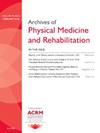美国乳腺癌老年患者康复利用率与自付费用之间的关系。
IF 3.6
2区 医学
Q1 REHABILITATION
Archives of physical medicine and rehabilitation
Pub Date : 2024-12-01
DOI:10.1016/j.apmr.2024.08.002
引用次数: 0
摘要
目的研究乳腺癌确诊后 12 个月内使用康复治疗与第二年(确诊后 12-24 个月)自付费用之间的关联:设计:对 2009-2019 年监测、流行病学和最终结果-医疗保险关联数据库进行二次分析。将接受康复服务的患者与未接受康复服务的患者进行倾向分数匹配。使用伽马分布的广义线性模型对总体模型和医疗服务特异性模型进行检验:美国的住院和门诊医疗机构 参与者:35,212 名确诊为非转移性乳腺癌的患者,他们在确诊前 12 个月和确诊后 24 个月内连续参加了医疗保险收费服务(A、B 和 D 部分):不适用 主要结果指标:个人成本责任,即自付费用,定义为诊断后第二年(诊断后 12-24 个月)的免赔额、共同保险和共付额:结果:与未使用康复服务的患者相比,使用康复服务的患者的平均个人自付费用更高(4,013 美元对 3,783 美元),但这一差异不具有临床意义(d=0.06)。接受康复服务者的个人医疗费用(1,634 美元对 1,476 美元)、机构门诊费用(886 美元对 812 美元)和处方药费用(959 美元对 906 美元)明显较高,而机构住院费用(455 美元对 504 美元)和耐用医疗设备费用(81 美元对 86 美元)则明显较低:结论:与未接受康复服务的老年人相比,接受康复服务的乳腺癌老年人在确诊后第二年的费用负担更高。今后的工作还需要研究康复与自付费用之间在更长时期内的关系,以及与感知到的益处之间的关系。本文章由计算机程序翻译,如有差异,请以英文原文为准。
Associations Between Rehabilitation Utilization and Out-of-Pocket Costs Among Older Adults With Breast Cancer in the United States
Objective
To examine the association between rehabilitation utilization within 12 months of breast cancer diagnosis and out-of-pocket costs in the second year (12-24mo after diagnosis).
Design
Secondary analysis of the 2009-2019 Surveillance, Epidemiology and End Results-Medicare linked database. Individuals who received rehabilitation services were propensity-score matched to individuals who did not receive services. Overall and health care service-specific models were examined using generalized linear models with a gamma distribution.
Setting
Inpatient and outpatient medical facilities.
Participants
A total of 35,212 individuals diagnosed with nonmetastatic breast cancer and were continuously enrolled in Medicare Fee-For Service (parts A, B, and D) in the 12 months before and 24 months postdiagnosis.
Intervention
Not applicable.
Main Outcome Measures
Individual cost responsibility, a proxy for out-of-pocket costs, which was defined as deductibles, coinsurance, and copayments during the second year after diagnosis (12-24mo postdiagnosis).
Results
The mean individual cost responsibility was higher in individuals who used rehabilitation than those who did not ($4013 vs $3783), although it was not a clinically meaningful difference (d=0.06). Individuals who received rehabilitative services had significantly higher costs attributed to individual provider care ($1634 vs $1476), institutional outpatient costs ($886 vs $812), and prescription drugs ($959 vs $906), and significantly lower costs attributed to institutional inpatient costs ($455 vs $504), and durable medical equipment ($81 vs $86).
Conclusions
Older adults with breast cancer who received rehabilitation services had higher cost responsibility during the second year after diagnosis than those who did not. Future work is needed to examine the relationship between rehabilitation and out-of-pocket costs across longer periods of time and in conjunction with perceived benefit.
求助全文
通过发布文献求助,成功后即可免费获取论文全文。
去求助
来源期刊
CiteScore
6.20
自引率
4.70%
发文量
495
审稿时长
38 days
期刊介绍:
The Archives of Physical Medicine and Rehabilitation publishes original, peer-reviewed research and clinical reports on important trends and developments in physical medicine and rehabilitation and related fields. This international journal brings researchers and clinicians authoritative information on the therapeutic utilization of physical, behavioral and pharmaceutical agents in providing comprehensive care for individuals with chronic illness and disabilities.
Archives began publication in 1920, publishes monthly, and is the official journal of the American Congress of Rehabilitation Medicine. Its papers are cited more often than any other rehabilitation journal.

 求助内容:
求助内容: 应助结果提醒方式:
应助结果提醒方式:


